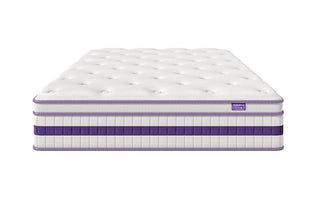How We Test Mattress Firmness
We occasionally receive free products for testing and take part in affiliate programs, which means we may earn a commission if you purchase items through links on our site. For full details, please refer to our disclosure page.
If you’re on the hunt for a new mattress, you’ve probably come across firmness ratings. But here’s something you might not know: firmness ratings are more of an educated guess than a solid science, because mattress firmness is totally subjective.
Your body type, weight, and what you personally like all play a role in how soft or firm a mattress feels, which means the same mattress could feel totally different to different people.
The good news? Getting a grip on how mattress firmness works, and how the industry usually measures it, is the best way to find a firmness level that works for you. In this guide, I’ll break down everything you need to know.
The Mattress Firmness Scale
When a mattress company talks about firmness, they’re describing how the mattress feels when you lay on it. Some mattresses are super soft and give — you’ll feel like you’re sinking in. Others are firmer, making you feel like you’re just resting on top. All of these things tie back to the mattress’s firmness. To give you a better idea of what to expect, especially for a mattress you can’t try out in person before buying, mattress brands use a firmness scale.
The mattress firmness scale runs from 1 to 10, with 1 being the softest and 10 being the hardest. Most mattresses land in the middle, around a 6.5, which is considered medium-firm.

Soft
Most soft and plush mattresses usually sit somewhere between a 3/10 and 6/10 on the firmness scale, thanks to things like soft foams and comfy pillow tops.
Soft mattresses are known for that super cushy feeling, with deep sinkage, a snug fit around your body, and some serious pressure relief. The Helix Sunset hits a 5.5/10 on the firmness scale. The Layla Memory Foam Mattress, which you can flip, has one soft side at a 6/10 and a firmer side at an 8/10. Check out our list of the best soft mattresses if you're looking for more choices.
You don’t usually see mattresses rated below about a 3/10 on the firmness scale. Once you go that low, it’s usually too soft to offer proper support.
Who It’s Good For:
- Lightweight folks. If you don’t have enough weight to really sink into the mattress, lightweight sleepers often feel like mattresses are firmer than they’re supposed to be. A soft mattress might be the answer if you want more comfort.
- Side sleepers. If you're someone who sleeps on their side, you’ll need more softness to properly cushion your hips and shoulders, so a soft mattress could work great.
- People who need pressure relief. Soft mattresses that mold closely to your body’s shape spread your weight out better, which can help ease pain in areas like your lower back, hips, and shoulders.

Medium-Firm
Medium-firm mattresses are great for a lot of different sleepers, making them a solid middle ground for couples with different preferences. Most medium-firm mattresses are about a 6.5/10 on the firmness scale, but you can go a little higher for a 7/10 if that’s more your vibe.
This firmness level has a balanced feel, usually from softer foam layers sitting on top of a supportive base. It gives you a mix of comfort and support, with a little bit of sinkage where there’s more pressure, but overall, it keeps your body feeling lifted.
Because they work for so many types of sleepers, you’ll find plenty of medium-firm mattresses out there, both in hybrid and all-foam designs. The Helix Midnight, Nolah Evolution, and Birch are solid examples of different medium-firm options.
Who It’s Good For:
- Average-weight back and side sleepers. If you weigh between 130 and 230 lbs, a medium-firm mattress should give you a nice balance of back support and pressure relief. These also work for combo sleepers who shift between back and side positions.
- Some back sleepers over 230 lbs. Heavier back sleepers can still get plenty of support from medium-firm mattresses.
- People wanting a mix of comfort and support. If you’re into that middle-ground feel, where it’s comfy but still gives you good support, medium-firm is the way to go.

Firm
Mattresses that score 7/10 or higher are considered firm. It’s pretty rare to come across a mattress that’s rated a 10/10. Even the Plank Firm, the toughest mattress we've tried, only hits a 9/10 on its firm side.
Firm mattresses don’t really allow for much, if any, sinkage. They give the feeling that every part of your body touching the mattress is being lifted evenly.
The Helix Dawn, the WinkBed ("Firmer" version), and the Bear Original are some well-known firm options. You can find more choices in our list of the best firm mattresses.
Who It’s Good For:
- Stomach sleepers. Stomach sleepers need a mattress that keeps their hips in the right position to avoid back pain. Firm mattresses usually do the job.
- A lot of people who weigh over 230 lbs. Heavier folks tend to sink more into a mattress, which can make it feel softer. That’s why firm mattresses are often the right call for people who weigh more than 230 lbs.

What is the Best Firmness for a Mattress?
Once again, mattress firmness is pretty subjective, which means there’s no one-size-fits-all when it comes to the best firmness. The perfect mattress firmness depends on things like your body type, sleeping position, and what you personally like.
Take back sleepers, for instance. They need a mattress that’s firm enough to support them properly but soft enough to keep that lower back area from getting tight. Medium-firm mattresses usually work best because they offer enough support to keep your spine in line, but still have that bit of softness to help with pressure and pain.
For side sleepers, soft mattresses can really help relieve pressure at the shoulders, hips, and lower back. Stomach sleepers, however, need firmer mattresses to keep their hips lifted and supported. Otherwise, their spine ends up out of whack, which leads to back pain. Most stomach sleepers do well with a mattress that rates around 7/10 or higher in firmness. Plenty of mattresses offer that sweet spot of firmness and alignment to support your back and keep your spine straight, like the ones we cover in our best mattresses for back pain review.
Is Firmness the Same as Support?
Even though people often mix up the terms "firmness" and "support" when talking about mattresses, they’re not the same thing. Firmness, as we’ve discussed, is about how the mattress feels when you lie on it. Support is all about how well it helps keep your spine properly aligned.
How to Find the Right Mattress Firmness
Choosing the right mattress firmness really comes down to thinking about what you need. Picking between firm and soft mattresses is based on two main factors.
Sleeping Position
First up, how you sleep is the biggest factor. Back sleepers usually do well with something in the 6/10 to 7/10 range. Stomach sleepers should go for something firmer, like 7/10 or higher. Side sleepers will want something softer, with mattresses that land between a 5/10 and 6.5/10.
Weight
Your body weight also plays a big role in how soft or firm a mattress feels. Two back sleepers who weigh different amounts — one light and one heavy — will feel the same mattress differently. Taking your weight into account can help you pick a mattress that’s perfect for your sleeping position, no matter how the manufacturer rates its firmness. If you’re over 230 lbs and need a mattress that gives you the right support, check out our best mattress for heavy people list.
When in Doubt, Opt for Medium-Firm
If you’re still on the fence about which firmness is right for you, medium-firm is usually a safe choice. These mattresses are called “universally comfortable” for a reason — they work for a wide variety of body types and sleep styles.

















